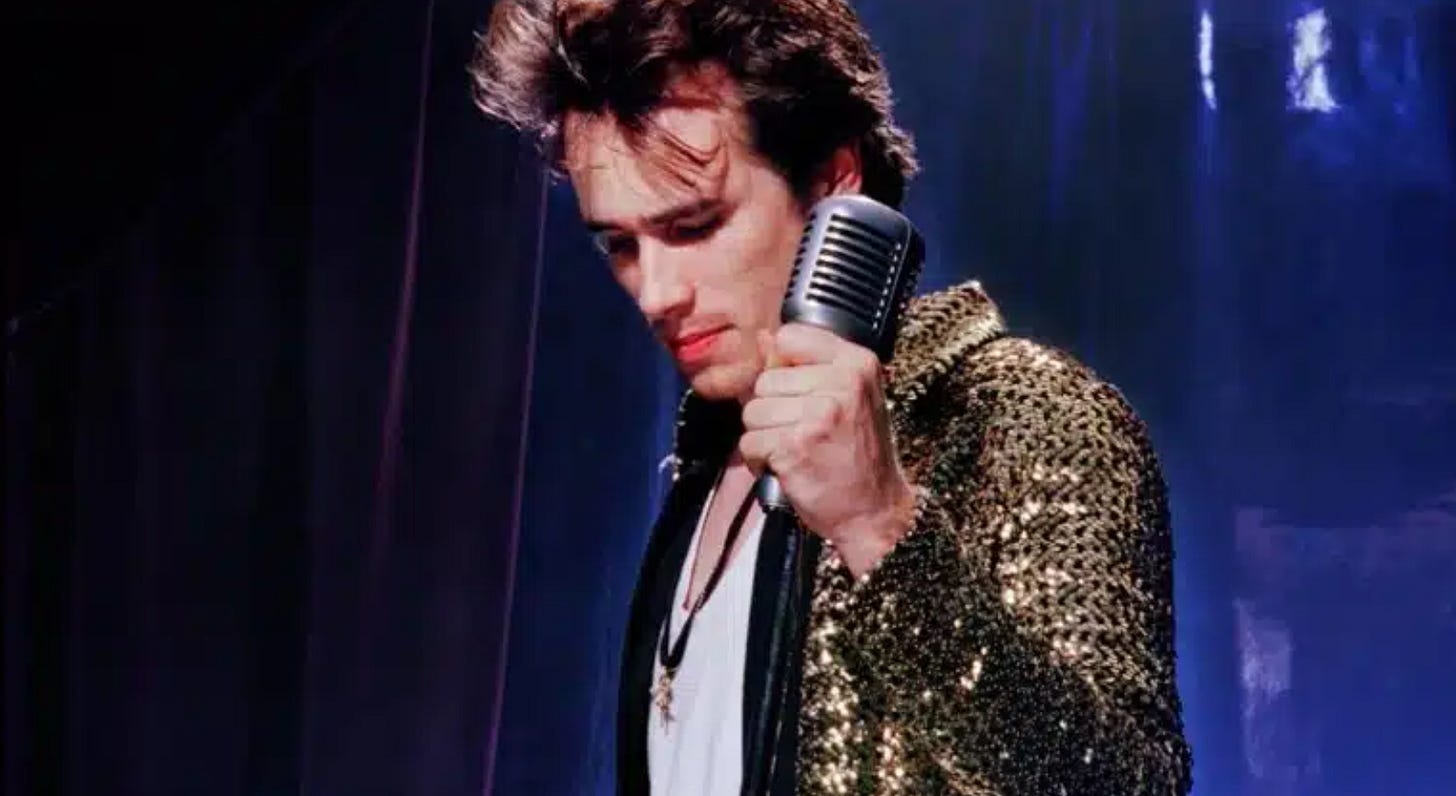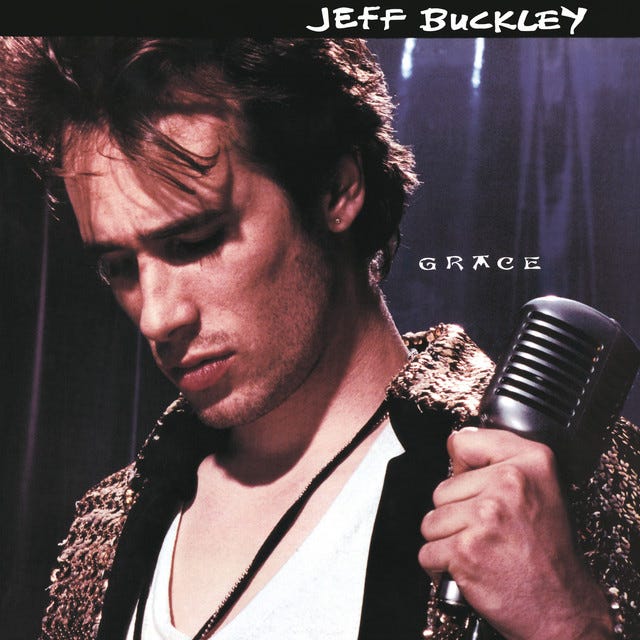From the archives: Jeff Buckley
Grace: The Album That Will Not Go Gently Into That Goodnight.
What Pearl Jam did for flannel shirts, Jeff Buckley did for the white V-neck t-shirt. And even though he only recorded one proper album, Grace, it’s one of the best albums of the 1990s… arguably, one of the best albums in rock history.
It’s that good.
I recently watched the Jeff Buckley documentary, It’s Never Over, Jeff Buckley, and would’ve been moved to tears if not for my cat deciding to vomit at two peak moments. This is in no way indicative of the film, which is fantastic, but cleaning cat vomit has a way of taking you out of the moment.
The film, directed by Amy Berg (Janis: Little Girl Blue), covers all that a documentary should cover and spends a fair amount of time on the Grace period of Buckley’s career, which makes sense.
Grace is that rare, timeless album that continues to grow in stature as more people become aware of Jeff Buckley’s unique brilliance.
Jeff Buckley’s biological father was folk and jazz artist Tim Buckley, a moderately popular artist in the 60s and 70s who died in 1975 of a drug overdose.
While Jeff Buckley only met his biological father once, after Tim’s untimely death, Jeff decided to use his biological surname, Buckley.
After graduating from high school, Buckley was in Los Angeles and began making his way around the scene as a guitar player, picking up sessions here and there and playing in various bands. Still, his skills were primarily met with indifference. Six years later, in 1990, he moved to New York City, but he found the same degree of indifference he had encountered in LA.
That is, until April of 1991, when a tribute to Tim Buckley — Greetings from Tim Buckley — was staged at St. Ann’s Church in Brooklyn, New York. The younger Buckley got invited to perform, and along with experimental rock guitarist Gary Lucas, Buckley performed “I Never Asked To Be Your Mountain,” a song Tim Buckley wrote about the infant Jeff and his mother. He also performed:
“Sefronia — The King’s Chain”
“Phantasmagoria in Two”
“Once I Was”
The buzz began.
Around the same time, Buckley landed a job and recurring gig at the Lower East Side Sin-é — (pronounced shin-ay), which is Irish for “That’s it.” And it was “it” for Jeff Buckley as he washed dishes and perfected his craft. While he would eventually incorporate originals, during that time, his set covered songs by a myriad of artists, including Nina Simone, Nusrat Fateh Ali Khan, and Bad Brains.
By the summer of 1992, the industry that had once all but ignored him began to take notice - serious notice. In October of that year, Buckley signed with Columbia Records, in what was reportedly a million-dollar deal.
A few months later, Buckley had recorded a lot of his solo material, singing a cappella, and using acoustic and electric guitars with Steve Addabbo (Suzanne Vega, Shawn Colvin). Formal sessions were scheduled for the summer of 1993 with producer Andy Wallace, who was then riding high after mixing Nirvana’s Nevermind.
On Grace, Wallace would wear three hats — producer, engineer, and mixer. He’s responsible, in large part, for the sheen and timeless sound of the album.
After hiring bassist Mick Grøndahl and drummer Matt Johnson, the trio began rehearsing Buckley’s material. In September of 93, they left NYC for Bearsville Studios in Woodstock, New York. Along with Wallace, they would spend six weeks recording basic tracks for Grace.
After returning to NYC, Buckley would spend time overdubbing at various studios, attempting to capture perfect vocals and adding layers of texture to the songs.
In November of 1993, the EP Live at Sin-é came out on Columbia Records. Despite a Van Morrison cover (“The Way Young Lovers Do”), it was met commercially with indifference here in the United States. That said, it did chart in several European countries, including Ireland, where he remains very popular.
Then the hammer dropped on August 23, 1994, when Grace was officially released.
The album features seven Buckley originals and three covers: “Lilac Wine,” based on Nina Simone's version; “Corpus Christi Carol,” from Benjamin Britten’s A Boy Was Born; and “Hallelujah” by Leonard Cohen.
Buckley’s version of “Hallelujah” is primarily regarded as his “best” song - but that’s all subjective. However, it is worth noting that it has over one billion streams and has been inducted into the Library of Congress’s National Recording Registry.
What comes together on Grace are Buckley’s influences, paired with his unique singing, which sounds like an almost effortless approach to the songs (but is far from effortless).
The record captures a particular buckshot approach. 1994 was the peak of grunge, and Grace was anything but; at one moment, pure, unadulterated rock and roll, and at another, jazz-influenced and almost torchy. The album defies easy categorization and gives off an “I don’t give a fuck” attitude that Gen X’ers were (are) known for. However, if you took the time to listen to Grace just as if you took the time to talk to a Gen X’er, you’d see that there were layers of complexity and sensitivity that go much deeper than “I don’t give a fuck.”
It should be noted that the record is heavily front-loaded.
The one-two-three wallop of the opening tracks —“Mojo Pin,” “Grace,” and “The Last Goodbye”—is the bait that will get you hooked, and, at least for me, would ultimately define not only the album but Buckley as an artist.
The album's opener, “Mojo Pin,” is about, according to Buckley: “Sometimes if somebody you feel you need… the whole universe tells you that you have to have her, you start watching her favorite TV shows all night, you start buying her the things she needs, you start drinking her drinks… this is called Mojo Pin.”
On the second track, Buckley lays it on the line — “Grace” is, “It’s about not feeling so bad about your own mortality when you have true love.”
After those first two openers, it’s the gutting reality of “The Last Goodbye” that lets you know you’re listening to something truly unique. It’s almost five minutes of pure perfection. And like the best love affairs, it goes by both too quickly and lasts for just the right amount of time.
At times ethereal, the rest of the album flows like water over a rock. Except for the outlier on the album, the hard-edged “Eternal Life” is an homage to Buckley’s love of Led Zeppelin.
Initially, the accolades for Grace weren’t seen in record sales or even with critics, but by legendary contemporaries:
Led Zeppelin’s Jimmy Page considered Grace close to being his “favorite album of the decade.”
Bob Dylan, named Buckley “one of the great songwriters of the decade.”
David Bowie named Grace as one of 10 albums he’d bring with him to a desert island.
Despite the growing universal acclaim, record sales for Grace remained sluggish in the United States, but the record was considered a hit in Europe. But by the end of 1994, Grace was in or on top of some of the “Best of” lists of that year, among them:
Mojo Magazine Top 25 albums — #1
Teknicart Top Five albums of 1994 — #2
Melody Maker Best 50 albums of the year — #9
Rocksound Best albums of 1994 — #2
Entertainment Weekly Top 10 albums of 1994 — #6
But not everyone was a fan. Before giving it a “C” rating in The Village Voice, Robert Christgau finished his review by stating: “So let us pray the force of hype blows him all the way to Uranus.” Safe to say, he didn’t much care for Grace.
A little more verbose and far friendlier, Chicago Tribune music critic Greg Kot wrote:
“Jeff Buckley’s voice not only has range, it has a soulful intensity that sends chills. The music has a rolling-and-tumbling dynamic that suits the swooning vocals, the crash-and-burn of ‘Eternal Life’ of a piece with the jazzy atmospherics of ‘Lilac Wine’ and Leonard Cohen’s ‘Hallelujah,’ a masterpiece that Buckley wholly inhabits.”
After touring the world more than once in support of Grace, Buckley took some time off before decamping to Memphis to begin writing and recording for his second album.
On May 29, 1997, along with roadie Keith Foti, Buckley went swimming fully dressed in Wolf River Harbor, one of the Mississippi River's slack water channels. Foti remained on shore and moved a couple of things out of the wake of a passing boat. By the time he turned around, Buckley had disappeared.
Despite a rescue effort, Jeff Buckley was not found until June 4.
The autopsy showed no signs of drugs or alcohol in his system, and his death was ruled an accidental drowning. The music industry ruled it one more tragic loss.
By coincidence, former girlfriend, Elizabeth Fraser of the Cocteau Twins, recorded the Massive Attack song “Teardrop” on the day he died and later stated: “That was so weird … I’d got letters out, and I was thinking about him. That song’s kind of about him — that’s how it feels to me anyway.”
The tributes have carried on over the years. Artists of varying genres have written songs to pay homage to the creativity of Jeff Buckley. These are a few:
Aimee Mann — “Just Like Anyone”
Glen Hansard — “Neath the Beeches”
Juliana Hatfield — “Trying Not To Think About It”
Pete Yorn — “Bandstand in the Sky”
Duncan Sheik — “A Body Goes Down”
Chris Cornell — “Wave Goodbye”
Lana Del Rey — “Gods and Monsters” (the name of Buckley’s band in NYC)
The mark of an artist who recorded only one proper studio album 31 years ago and how they can still influence and impact musicians to this day is the identifier of the magnitude of Jeff Buckley’s talent and the loss with his untimely death.
While I don’t think they’re the same kind of artist, try to imagine if Bruce Springsteen had passed away after Greetings from Asbury Park.
As summer gives way to cooler evenings, give Jeff Buckley’s Grace a spin and let the album’s simple elegance envelop you; you’ll discover that the album is aptly titled.





I'm yet to watch the documentary, but I did watch the Janis one and really liked it (I was unaware of the connection). Amazing tribute you've written here, and I agree with every word you said. I love this record (what's not to love, right?). I managed to get it on vinyl not too long ago and it's sublime. I particularly liked what you said about Gen X's "I don't give a fuck" attitude having deep layers of complexity which often get overlooked or misunderstood. This is so true. I'm too young to be Gen X but I do have a lot of friends and loved ones from that generation, all from different walks of life, and what you said applies to all the GenXers I know, without exception.
Christgau also gave Black Sabbath’s debut a C. Learning he gave the same grade to “Grace” sparks a new rule:
If Robert Christgau says it’s a C, I’m probably gonna love it.